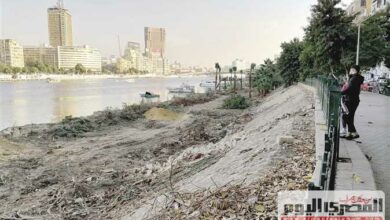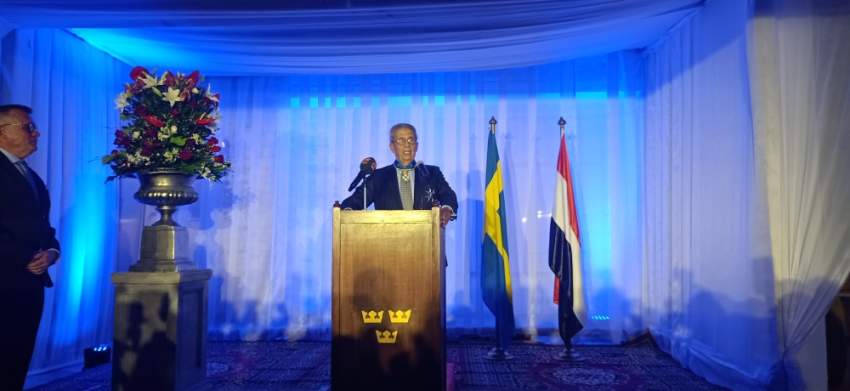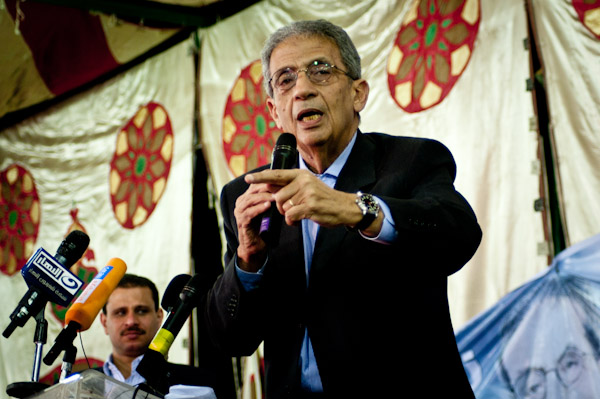With a strong and steady voice, and the ability to alternate at will between the image of the intimidating statesman and the approachable man of the street, Amr Moussa has managed to become the front runner in the presidential elections following a revolution that overthrew the regime he served under.
The 76-year-old veteran politician is now on a race to reinvent his image and sell himself as a revolution supporter.
It remains to be seen, though, whether he can convince the public he is a reformist before they take to the polling stations to choose their new president in May.
Kicking off a career of political and public diplomacy
Moussa started his career in the Foreign Affairs Ministry in 1958. He advanced quickly and represented Egypt in a number of countries, ending up as the permanent representative of Egypt to the United Nations in 1990.
In 1991, Moussa was appointed as minister of foreign affairs and continued to serve in this post for 10 years. During this time, Moussa’s popularity exploded, in large part due to his anti-Israel rhetoric. Moussa is also well-known for his expansion of Egypt’s European relations and his public opposition to Israel and its nuclear expansion.
In 2001, Moussa was appointed secretary general of the Arab League, where he served for another decade. Many believe former President Hosni Mubarak orchestrated his removal from national politics because he was intimidated by Moussa’s growing popularity.
In the following years, Moussa was able to maintain his public appeal without invoking Mubarak’s ire. A 2006 Wikileaks cable mentions him as a possible successor for the former president, along with Gamal Mubarak and Intelligence Chief at the time Omar Suleiman, labeling Moussa as the "dark horse" candidate.
In the league, Moussa gained most of his popularity through statements made for public consumption rather than implementation of actual policies.
His public position against Israel, an easy score of public sympathy, is a case in point.
His fiery speeches even earned him a seminal song from the popular Shaaban Abdel Rehim dubbed “I hate Israel and love Amr Moussa.”
But independent newspaper Youm7 published a letter sent by Moussa in 1993, when he was the foreign affairs minister, to the petroleum minister at the time, expressing his approval of exporting gas to Israel.
After the revolution, though, Moussa joined the public in criticizing the deal, calling it a failed economic venture.
Moussa has admitted he sent the letter in media appearances and explained his position, saying that it was necessary to export gas to Israel in order to be able to export it to the Palestinians as well.
During the Israeli war on Gaza in 2009, Moussa gave one of his landmark speeches at the Davos World Economic Forum, in which he condemned the Israeli attack on Gaza and the blockade enforced after Hamas came to power in 2006. He said he did not support an armed Palestinian resistance, but added that it was justified by the occupation of their lands and the blockade.
Moussa ended his speech by saying that the Arabs are ready on the highest official levels to “recognize Israel and normalize with Israel and have Israel as part of the family of the Middle East.” These statements were made just one day after he called the war on Gaza “carnage.”
Adjusting to the revolution
Moussa dealt with the toppling of the regime in Egypt with the same fluidity that has served him well throughout his career.
Since the start of his campaign in March, Moussa has been trying to distance himself from Mubarak’s regime, painting an image of his past as an outcast official resisting the regime he serves under.
When asked about his relationship with the former president, Moussa only mentions the differences that caused clashes.
In a television appearance last week, he described his 10 years serving in the Foreign Affairs Ministry under Mubarak as “the most difficult years of my life.”
What Moussa had to say about Mubarak before the revolution, however, is very different.
In an interview in 2010 with the satellite channel Dream TV, Moussa described his work relationship with the deposed president as “positive” and announced he would vote for Mubarak if he ran for a sixth term as president no matter who ran against him.
A gradual and carefully calculated conversion from a regime loyalist to a revolution supporter can be detected in the Moussa’s change on positions, which began when former Tunisian President Zine al-Abidine Ben Ali fled in January 2011.
In a speech on 19 January, days after a popular uprising succeeded in deposing Ben Ali, Moussa gave a speech at the Second Arab Economic Summit in Sharm el-Sheikh, which he now references in nearly all of his media appearances as a sign of his early siding with the people.
While the speech lacked any criticism of Mubarak’s regime, Moussa spoke about the growing anger of the Arab people and the dire need for economic reforms to enhance their standards of living. At the end of the speech, he thanked Mubarak and his government for their efforts in organizing the conference.
When the 25 January protests broke out, Moussa positioned himself on the “wise men committee,” which tried to mediate between the revolutionaries and the regime, with little success.
The committee allowed Moussa to stay in the middle ground without announcing his support for either side until the situation cleared up.
Moussa has said in recent TV appearances that he joined protesters in Tahrir Square following the 2 February attack on them by former regime thugs, known as the Battle of the Camel. However, Russia Today quotes Moussa’s office at the time as saying that he was in the square to try to calm protesters.
Moussa recently said that the Battle of the Camel was the last straw that made him realize that the regime was full of lies and deception and had to go.
Interviews that he made up to 7 February however, show Moussa was content to let Mubarak finish his term and leave in September, which was staunchly rejected by protesters.
Despite his previous support for this scenario, Moussa appeared on the Saudi satellite channel of Al-Arabiya on the day following Mubarak’s resignation, announcing that it was a great opportunity for the Egyptian people.
Swinging in the transition
Just as he never criticized Mubarak’s regime while it was in power, Moussa takes the same shrewd position with the ruling military council and the Muslim Brotherhood, whose political wing, the Freedom and Justice Party, dominates Parliament.
Having been part of a regime that outlawed the Muslim Brotherhood, Moussa at first stayed true to his negative perception of the group — that is, until their win of about 43 percent in the September parliamentary elections.
In an interview with Foreign Policy in June, Moussa called for presidential elections to precede parliamentary elections, warning that otherwise, the Brotherhood would dominate Parliament “and then there will be chaos.”
Following their parliamentary win, Moussa has been referring to the Muslim Brotherhood as a “nationalist group” and expressing his willingness to cooperate with them, in what some say is an attempt to win their backing. The group has not announced which presidential candidate it will support.
Moussa has also changed his view of the system best fit to rule Egypt in the coming period to correspond with that chosen by the Brotherhood. After initially calling for a presidential system, Moussa recently advocated convincingly for the mixed presidential and parliamentary system, which the Brotherhood has proposed.
Following the many clashes that erupted throughout the last year between security forces and protesters, which have resulted in more than a hundred civilian casualties, Moussa’s responses always demanded a speedy investigation to determine responsibility, but never included any direct criticism or condemnation of the ruling military council, which is in a position of political responsibility for the events.
Moussa also follows the military council’s example in claiming that the people attacked by the military are not revolutionaries but “anarchists” that have to be stopped.
Targeting the masses
Even in the midst of crisis, Moussa never lost track of his political ambition. On 2 February of last year, the day after Mubarak announced that he wasn’t intending to run in the next presidential elections, Moussa told Al-Arabiya news he might run for the post.
Since the official announcement of his bid for presidency in March 2011, Moussa has been relentlessly roaming villages and governorates, making contact with the critical voting mass in Egypt.
He has not tried to openly woo the revolutionary forces, which are the most resistant to Moussa’s candidacy, considering him an extension of the old regime.
Many of Moussa’s campaign events have been attacked by people calling him a remnant of the regime. But with his trademark resilience, Moussa has been able to absorb their criticism in the most diplomatic way.
In his campaign events and media appearances, Moussa rarely goes into poetic speeches glorifying the revolution like other candidates. Instead, he discusses decreasing the poverty rate in Egypt, improving education and attaining social justice.
Even though he has not offered detailed plans on how to do so, showing concern for the ordinary citizen’s problems gives Moussa more credit with many Egyptians.
For the well-to-do, Moussa sells himself as a viable secular option to the increasing Islamization of the state, albeit not positioning himself in direct opposition to Islamic forces.
Amr Moussa supporters say that with his vast political and diplomatic experience that exceeds that of all the other candidates, that he is the only one capable of running Egypt in this critical stage. Moussa’s supporters don’t consider him a part of the fallen regime and call him an inside reformer.
Moussa’s overall image is that of a strong statesman who has managed to survive a corrupting regime, but whose history with that regime acts sometimes as a daunting past. The vagueness of his stances, a by-product of a longstanding diplomatic career, had spared him from the battle of polarizing views that has waged around him.




